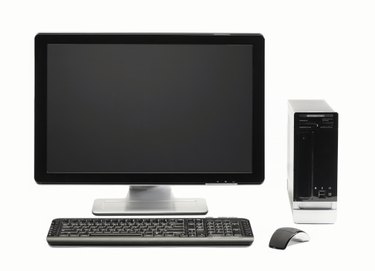
A gigahertz measures frequency and a gigabyte measures storage capacity. Frequency is the number of occurrences of a repeated event per unit of time. Together these terms describe the specifications of a personal or small business computer system: gigabytes refer to the hard disk and removable disk for storing applications and data files, and gigahertz refers to the speed of the central processing unit.
Facts
Video of the Day
A byte consists of eight bits, which is short for binary digits that have two values -- zero and one. A text character, such as "a" or "b," is one byte. One thousand bytes equal a kilobyte, one thousand kilobytes equal a megabyte and one thousand megabytes equal a gigabyte. At the time of publication, computers had hard disk capacities of 200GB or more.
Video of the Day
A hertz is one CPU clock cycle per second. The clock is used to synchronize events, such as moving data to and from memory. One thousand hertz equals a kilohertz, one thousand kilohertz equal a megahertz and one thousand megahertz equal a gigahertz. At the time of publication, entry-level personal computers had 2.5 Ghz CPUs.
Function
The processor speed along with random access memory determine how fast a computer can execute certain tasks. Mathematical computations and graphics processing are examples of applications that require faster processors.
The Internet allows data and applications to be shared over virtual servers. People can now store emails and files online. Using high-speed network connections, users can review a document, extract relevant portions and close it without having to save it on their computer's hard disk. However, storage space is still required for digital photographs, reports and spreadsheets, and productivity software applications.
Price
CPU prices follow Moore's law, which is named after Intel co-founder Gordon Moore. He predicted that the number of transistors will double about every two years -- as microprocessor speed and functionality increases, the comparative cost decreases. This is possible because of volume production, more efficient processes and some level of competition. A 2.5 Ghz computer at the time of publication actually costs less than the first computers on the market in the early-1980s, and it has substantially more functionality.
Storage prices have also fallen dramatically, but for somewhat different reasons. Storage, along with memory and other computer components, have become commodity products. Several manufacturers offer pretty much the same product. According to Pricewatch, a 750GB external hard drive retails for about $60, or about $0.08 per gigabyte, at the time of publication.
Buying Decision: Speed vs. Storage
Computer buying can be difficult because of the many options available. The budget determines the price range, and a trade-off is often required between speed and storage. If the computer use is mostly for word-processing functions and downloading music and video files from the Internet, storage is more important. However, if the computer use is mainly for mathematical and graphics processing, then the processor speed is more important.